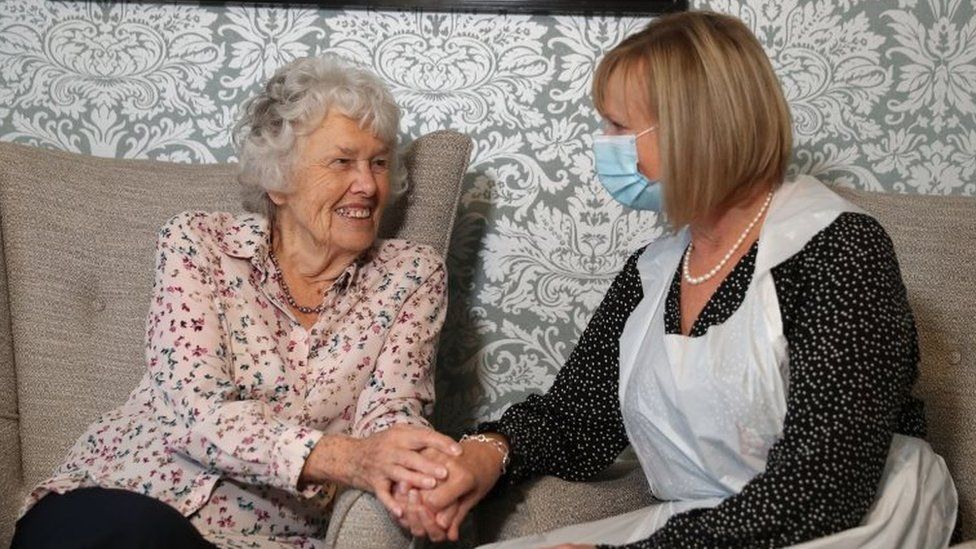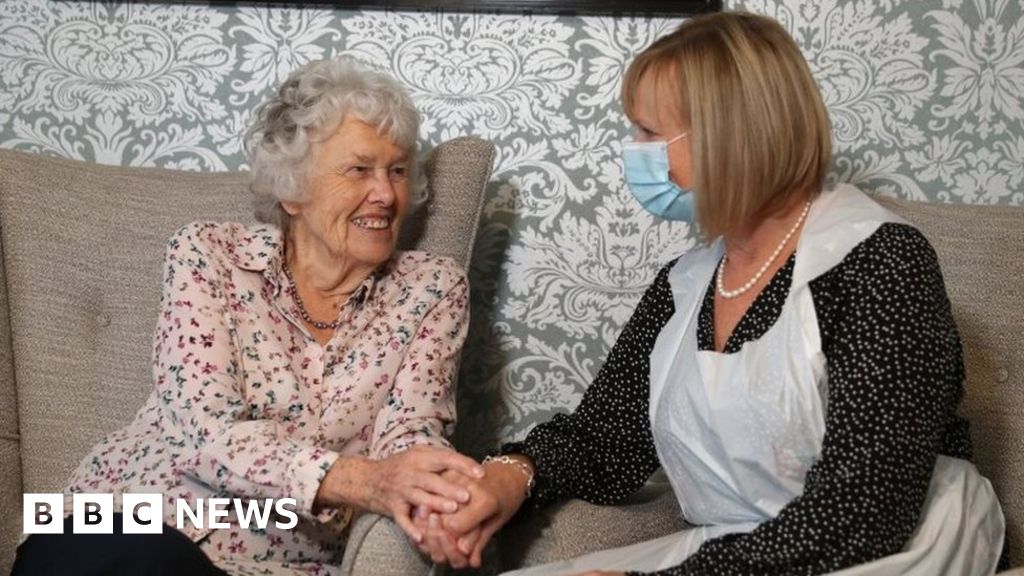
Care home residents will be able to leave their home for low-risk trips without having to self-isolate for 14 days afterwards, the government says.
The rules will be relaxed in England from Tuesday, allowing for walks or garden visits without self-isolation.
The government says a fall in Covid cases means it is “much safer” for care home residents to go outside.
The charity John’s Campaign says it is a “chink of light” for residents and their families.
It had threatened the government with legal action over the requirement that care home residents self-isolate for 14 days following any visit out.
There are different rules in the UK’s devolved nations, with residents in Wales able to leave homes – where there is no Covid outbreak – without isolating on their return.
Scotland’s guidance for care homes allows for residents to see loved ones outside of the care home, while rules for care homes in Northern Ireland vary by region.
Under the changes in England, residents on trips out must be accompanied by either a member of staff or one of their two nominated visitors and they must follow social distancing throughout.
They cannot meet in groups or go indoors, except for the use of toilets, and public transport should be avoided where possible.
An exemption is in place for those who wish to vote in person in the local elections on 6 May, the government says.
Only trips deemed “low risk” are exempt from the self-isolation rule, so this does not include activities such as overnight visits.
The Department of Health and Social Care said updated guidance would be published in due course.
Prime Minister Boris Johnson said he was “pleased” residents can “now leave their homes to reunite with their loved ones outdoors”.
“With the data continuing to head in the right direction and as restrictions ease, it is my priority to keep increasing visits for residents in the coming weeks in a safe and controlled way,” he said.


Fourteen days is a long time to be stuck in your room because you have ventured out with a relative for a walk or a visit to a park.
Guidance put in place to protect people from a virus which has claimed so many lives in care homes has more recently become a source of great anguish for many residents and families.
As life has begun to open up for others, younger people with disabilities, as well as older residents, have felt unable to leave their care home, trapped by the requirement to self-isolate on return.
Government guidance is there to balance the risks faced by an extremely vulnerable group of people, but with most residents vaccinated and infection rates falling, families complain that the guidance is too slow to change.
They argue that with each month of restrictions, the damage to the people they love deepens.

Care Minister Helen Whately said: “I know residents and their families have found the restrictions on trips out of care homes incredibly difficult.
“This is one more step towards getting back to normal, while protecting care homes from the continued risk of Covid-19.”
The government is expected to review the self-isolation requirement for more visits when it reaches the next stage of the government’s road map for easing restrictions on 17 May.
John’s Campaign co-founder Nicci Gerrard welcomed the news but said: “Why did this rule ever exist in the first place – depriving people of their liberty, turning care homes into prison, treating one group of people with such cruelty?”
Campaigners say the rule encourages care homes to act unlawfully by “falsely imprisoning” residents, with family members calling it “barbaric”.
Leigh Day partner Tessa Gregory, who is representing John’s Campaign, said: “It appears under the threat of legal proceedings, which the John’s Campaign were due to issue next week, the government has finally agreed to drop the blanket requirement that care home residents self-isolate for 14 days following any visit out.
“This will be a huge relief to residents, families and care homes who have all been crying out for change.”
She added they would be “scrutinising” the new guidance once it is published “to ensure that it is lawful and fit for purpose”.
The Independent Care Group also welcomed the government move, saying a lack of social contact and visits has been detrimental to the health of residents.
In a statement, the care provider body’s chair, Mike Padgham, said: “Our only gripe is that the government has announced that this can start immediately after the bank holiday, which doesn’t give care providers much time to prepare!
“This will be quite labour intensive for care and nursing homes and I think residents and their families will have to show patience and understanding whilst these visits are organised.”
Care home residents in England have been allowed one regular visitor since 8 March, in the first easing of lockdown.
